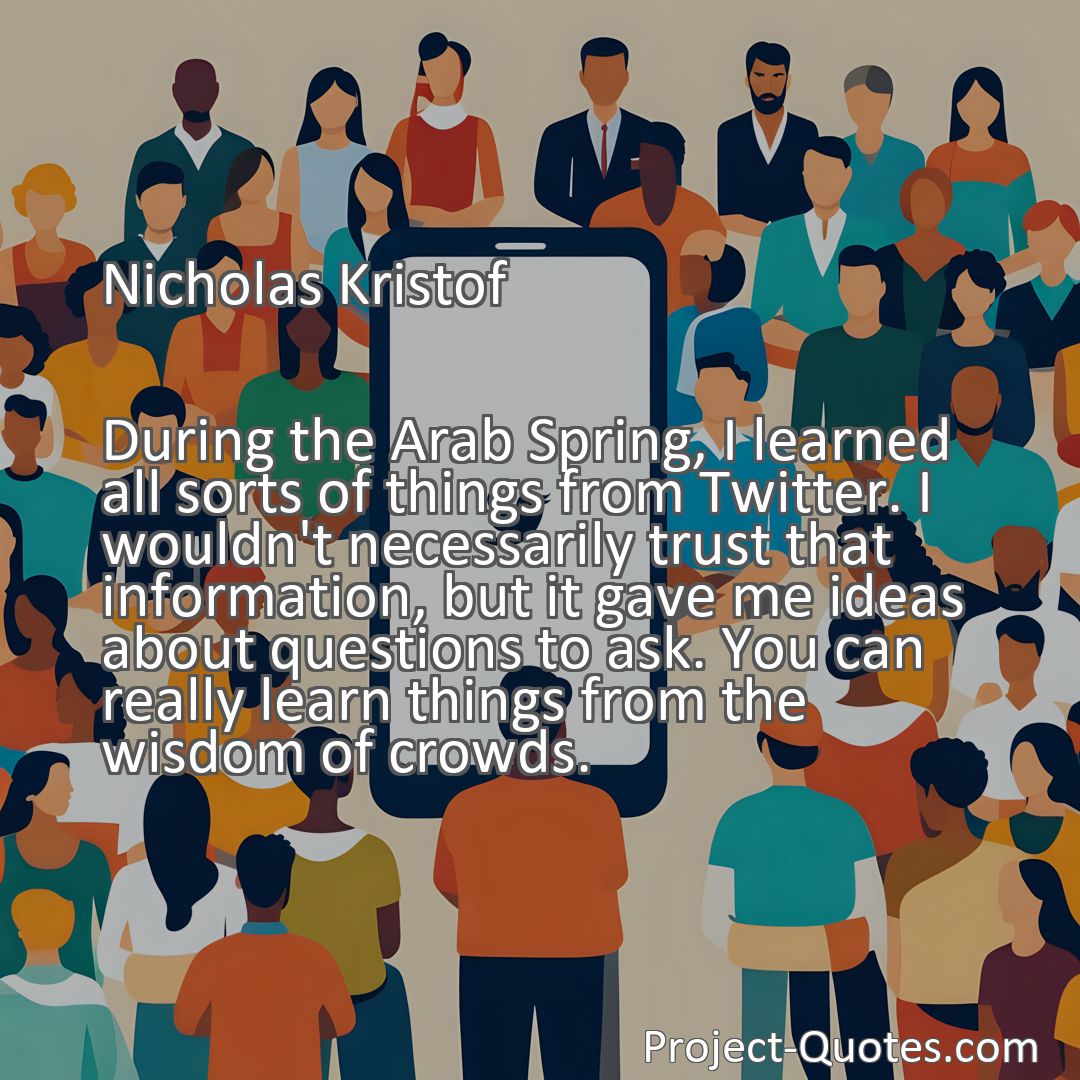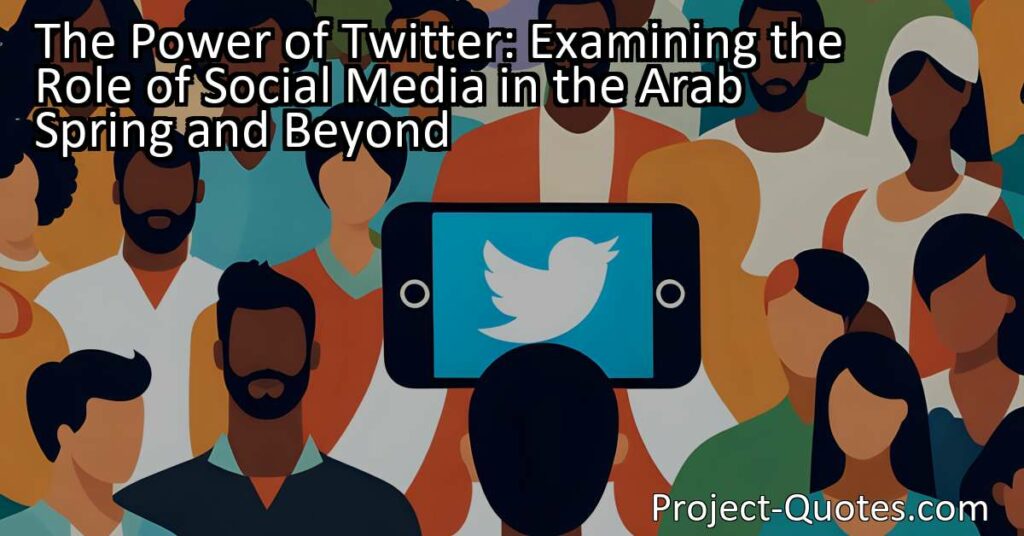During the Arab Spring, I learned all sorts of things from Twitter. I wouldn’t necessarily trust that information, but it gave me ideas about questions to ask. You can really learn things from the wisdom of crowds.
Nicholas Kristof
The Power of Twitter: Examining the Role of Social Media in the Arab Spring and Beyond explores how Twitter played a significant role during the Arab Spring in various Middle Eastern countries. While Twitter may not always provide reliable information, it serves as a source of inspiration and prompts critical thinking. By tapping into the wisdom of crowds and engaging with diverse perspectives, Twitter can deepen our understanding of complex events and foster a more informed and interconnected society.
Table of Contents
- 1 During the Arab Spring, I learned all sorts of things from Twitter. I wouldn’t necessarily trust that information, but it gave me ideas about questions to ask. You can really learn things from the wisdom of crowds.
- 2 Nicholas Kristof
- 3 Meaning of Quote – During the Arab Spring, I learned all sorts of things from Twitter. I wouldn’t necessarily trust that information, but it gave me ideas about questions to ask. You can really learn things from the wisdom of crowds.
- 4 Freely Shareable Quote Image
- 5 Related
Meaning of Quote – During the Arab Spring, I learned all sorts of things from Twitter. I wouldn’t necessarily trust that information, but it gave me ideas about questions to ask. You can really learn things from the wisdom of crowds.
The Power of Twitter: A Source of Ideas and the Wisdom of Crowds
Introduction:
In the midst of the Arab Spring, a time of political and social upheaval in various Middle Eastern countries, journalist Nicholas Kristof discovered a unique and unexpected tool that would shape his understanding of the events unfolding around him Twitter. In this article, we will delve into the quote by Kristof and explore the notion that, while information obtained from Twitter may not always be reliable, it can still serve as a valuable source of inspiration and prompts for thought-provoking questions. Additionally, we will discuss the concept of the “wisdom of crowds” and how Twitter, as a platform, facilitates the collective sharing of insights and knowledge.
The Role of Twitter during the Arab Spring:
The Arab Spring was a time of political change, social unrest, and revolution in the Arab world. While traditional media outlets were often limited in their coverage or biased in their reporting, Twitter emerged as a powerful means of communication for those involved in or observing the events taking place. Nicholas Kristof, a journalist renowned for his coverage of human rights issues, recognized the potential of Twitter as a tool for gaining insights and asking critical questions.
Learning from Twitter:
As Kristof suggests, the information obtained from Twitter during the Arab Spring should not always be taken at face value. It is essential to approach the platform with a critical mindset and verify the accuracy of the information shared. However, what sets Twitter apart is its ability to offer diverse perspectives and allow for the exchange of ideas and opinions. By immersing himself in the vast Twitter community, Kristof discovered that conversations, debates, and real-time updates provided him with valuable insights into the ongoing events.
Prompting Questions and Inspiring Curiosity:
Twitter serves as a catalyst for curiosity, prompting users to ask important questions and seek answers beyond the tweets themselves. The platform introduces individuals to new ideas, alternative viewpoints, and opinions that challenge preconceived notions. As Kristof noted, the information found on Twitter helped him identify the right questions to ask, enabling him to delve deeper into the complexities and nuances of the Arab Spring. By engaging with the Twitter community, one can harness the power of dialogue and critical thinking.
The Wisdom of Crowds:
The “wisdom of crowds” refers to the notion that a group of individuals collectively possesses a greater knowledge and insight than any single member. Twitter embodies this concept, effectively synthesizing the thoughts and experiences of countless users from diverse backgrounds. While individual tweets may be subjective or even muddled with misinformation, the cumulative effect of numerous perspectives becomes a valuable resource for journalists and researchers alike.
Through Twitter, users can tap into the collective intelligence of the crowd, gaining access to a wealth of disparate viewpoints and eyewitness accounts. This vivid tapestry of opinions helps reveal patterns, trends, and alternative understandings of complex situations. By acknowledging the wisdom of crowds, individuals like Kristof can triangulate information, cross-referencing multiple sources to create a more comprehensive picture of the truth.
Unleashing the Potential:
Twitter’s influence during the Arab Spring unveils the democratizing potential of social media platforms. It empowers individuals to share their lived experiences, challenge the status quo, and spark conversations on a global scale. The democratic exchange enabled by Twitter in times of unrest demonstrates the power of open communication, inspiring activists, journalists, and policymakers alike.
Beyond the Arab Spring: Twitter as a Tool for Learning:
The utilization of Twitter as a source of ideas and inspiration extends far beyond the specific events of the Arab Spring. Today, Twitter continues to be a platform where a multitude of voices is heard, ideas are exchanged, and questions are raised. Its power lies in its ability to connect individuals worldwide, crossing geographical barriers and fostering dialogue on a vast range of topics.
Conclusion:
Nicholas Kristof’s reflection on the role of Twitter during the Arab Spring highlights the potential of social media platforms as catalysts for critical thinking and knowledge acquisition. Despite potential pitfalls, such as misinformation, Twitter’s ability to provide a diverse range of perspectives and prompt questions propels individuals to examine issues from multiple angles. Recognizing the wisdom of crowds, we can harness the collective intelligence of the Twitter community to deepen our understanding of complex social and political events. By embracing the power of Twitter and approaching it with discernment and an open mind, we can continue to learn, grow, and contribute to a more informed and interconnected society.
I hope this quote inspired image brings you hope and peace. Share it with someone who needs it today!


